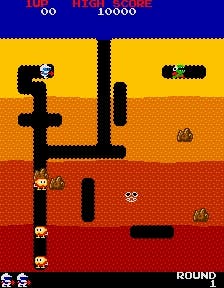Namco Museum 50th Anniversary Arcade Collection
A loveless exercise in retro rehashing.
When Namco started trawling out arcade compilations over ten years ago, the idea was hugely compelling. For starters, MAME was still in its infancy, and most of us hadn't come into contact with the real cabinets since the mid 80s. The mere possibility of playing our childhood favourites was an intoxicating one, and Namco did a fine job of drip-feeding them over six volumes, six games at a time. They were pretty expensive for what they were, but the concept of emulation was still a novel one. The idea of being able to play the real Ms Pac Man and Galaga at home was something we'd dreamed about since before the Spectrum, so you could say there was pent up demand.
Wandering around those 'virtual arcades' and checking out the promotional material felt like opening a time capsule. On top of that, you'd get a few less well-known games to check out into the bargain, so the educational value was even greater.
But then, of course, MAME grew to the extent that you'd end up with access to literally hundreds, nay thousands of arcade games. Suddenly the novelty value of these compilations dwindled to nothing and we needed more motivation to buy them.
Re-issue, re-package

If you were in Namco's position, you'd probably want to offer the sorts of things that legally suspect emulators couldn't. Innovative packaging, developer interviews, making-of documentaries, unreleased games, retrospectives. But no. Instead, all Namco has done since 1996 is re-issue compilations again and again and again.
Unlike, say, Taito (which rounded up a huge chunk of its best output on last year's excellent Taito Legends compilation, featuring 29 games), Namco seems bizarrely content to trawl out the same old games time and again. Not only that, it actually offers far less with this rather loveless release than any of its previous compilations, stripping out many of the features that made them a curiosity to hardcore collectors.
The original PlayStation editions, for example, gave users the choice of rotating the screen 90 degrees, so that gamers could (if they had the right set up) fill the entire screen with game and play it the way the designers intended. The games even booted up in the same quirky way the original machines did, complete with the chance to meddle with all the difficulty, lives and bonus settings. It may have looked a bit ugly, but it added to the feeling that these were the 'real' games, right in your own home.
A rush and a push and the cash is ours

This 16-strong compilation may house more games than any previous Namco collection, but it's actually in many senses the worst. Digital Eclipse (veterans of many arcade compilation) has done a spectacular rush job, with a set that does nothing to 'celebrate' Namco's 50th anniversary in any meaningful sense.
Regarding the games, few need any kind of introduction, which is a good sign at least. In the 'classics' camp, you've got some all-time must-haves in the shape of Pac-Man, Ms Pac Man, Galaxian, Galaga and Dig Dug. On the periphery, there's the likes of Mappy, Bosconian, Rally-X, Sky Kid and Xevious, and a couple of reasonable unlockables like Galaga 88 and Pacmania, while the less impressive Pole Position, Pole Position 2, Dragon Spirit and Rolling Thunder help make up the numbers.
The actual standard of emulation (outside of the nitpicking) is solid, and few can have any complaints. Apart from the points we've already mentioned, probably the most startling omissions are the lack of any sort of Xbox Live Leaderboard or high definition support. Unlike, say, the Atari Anthology (which supports 1080i on Xbox) there's not even 480p support, meaning the games all look a bit blurry on standard definition TVs. For games like this that were designed for rubbish TVs it's hardly a big deal, but you'd think Digital Eclipse would at least have offered that one small concession to progress.

